For HIV/AIDS Survivors, COVID-19 Reawakened Old Trauma—And Renewed Calls for Change
Forty years ago this month, the U.S. Centers for Disease Control and Prevention’s Morbidity and Mortality Weekly Report noted a rare lung infection among five otherwise healthy gay men in Los Angeles, Calif. Though they didn’t know it at the time, the scientists had written about what would turn out to be one of the historical moments that launched the Acquired Immunodeficiency Syndrome (AIDS) epidemic.
Since then, HIV/AIDS has killed an estimated 35 million people, including 534,000 people in the U.S. from 1990 to 2018 alone, according to UNAIDS, making it one of the deadliest epidemics in modern history. Over the last year-plus, another outbreak—the COVID-19 pandemic—has also extracted a terrible toll, killing more than 600,000 in the U.S. and more than 3.7 million globally.
[time-brightcove not-tgx=”true”]
For some of those who survived or otherwise had their lives irrevocably changed by HIV/AIDS, COVID-19 has been particularly challenging—those with HIV/AIDS may be at greater risk for severe conditions connected to infection with the coronavirus; and people with weakened immune systems may not get the same level of protection from vaccination as others. Over the last two months, TIME has been speaking with HIV/AIDS survivors about their experiences both with that epidemic and with COVID-19, and about the historical parallels between the two outbreaks. Their stories have been lightly edited for length and clarity.
Gina Brown
Brown, 55, lives in New Orleans and is the Community Engagement Manager for the Southern AIDS Coalition, which promotes access and care. She tested positive for HIV on April 4, 1994 while she was pregnant with her daughter.
In the beginning of HIV, what little was said about it was misinformation. I thought I was the first woman in the world with HIV. I didn’t know any other woman who was living with HIV at that time. Everything was geared towards gay men or focused on IV drug use, promiscuity, sex work, certain behaviors. People didn’t talk about contracting HIV in a monogamous relationship. The same with COVID, and it came from the top. With COVID, we heard misinformation from President Trump. “If you’re not sick, you don’t have to wear a mask.” Well, everyone should be wearing a mask! With HIV, misinformation came from legislators, and the President [Reagan] was just silent.
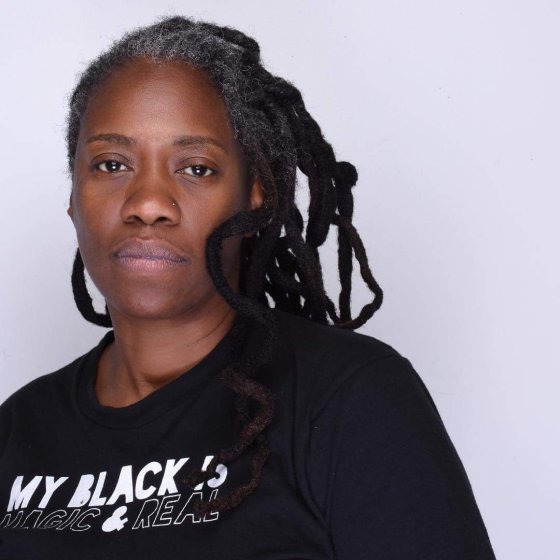
The isolation of COVID-19 reminded me of HIV, although the isolation from HIV was self-imposed. Both illnesses cause you to look at your fellow man as if they are a disease. My cousin, who was in his 20s, died from HIV in the 1980s. Normally in our family, if somebody is dying, you go and you kiss them, you tell them goodbye. Nobody did that.
I thought I would die the first year of my diagnosis. I only told my mom, my two sisters, and my children’s father. I started really isolating myself, not hanging out with my friends; I felt paralyzed when the word “HIV” was said, that they’d look at me and see that I had HIV. In 1994, when I had my daughter, no one ever came to my room in the hospital. They put my food outside my door, and I had to bring the tray in myself.
What also reminds me of COVID, is that marginalized people always bear the brunt—and they become the culprit. When people would talk about HIV, they would talk about Black gay men, and Black trans women, and Black women in a really negative light. And with COVID, people would say Black people die because they’re fat and they have diabetes. That wasn’t the story for everybody. People I know who died from COVID were essential workers—working at grocery stores, fast food places, at an HIV service organization.
With both HIV and with COVID, we weren’t seeing the humanity in each other.
Arthur Fitting
Fitting, 67, is a registered nurse who has worked for the non-profit home care agency Visiting Nurse Service of New York (VNSNY) for decades. He currently manages the organization’s LGBT program.
I was working in home health care in the West Village and Chelsea in Manhattan, which were areas where AIDS really started—and were hit the hardest. All of a sudden, patients were developing this mysterious illness, and I started to realize it was mostly gay men. There was nothing being said about how to treat these new patients. And especially as a gay man, I was really concerned about not knowing how it spread. You’re going into somebody’s home, and seeing so many of these patients; you didn’t know what was going to happen. Hospitals were not prepared; people were dying in cabs, in ambulances. Some emergency rooms weren’t even accepting AIDS patients. And when they came in, they were just dying in the ER.
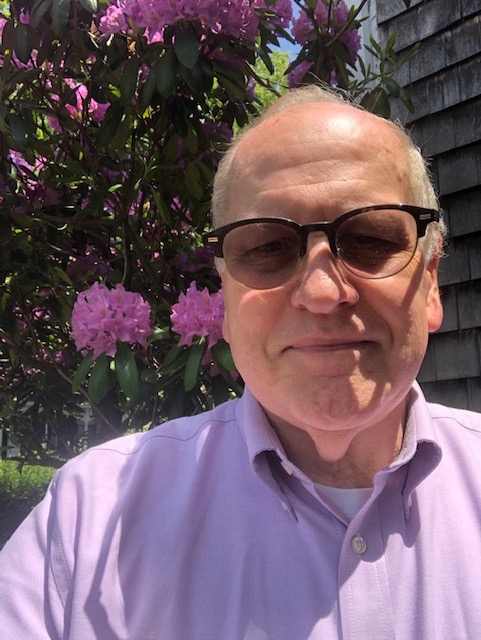
Once the public knew it was a gay-related disease, the homophobia started up even more. You had to be careful—people thought at that time that this came from gay people, so gay people should be punished. One time, I got punched in the face in the West Village at random.
When we realized [in 1985] my partner had AIDS, I was in such shock. I walked about 60 blocks in a fog, thinking and thinking. My partner became ill quite rapidly. With older people, you might have a little preparation, but my partner was in his 20s. I took care of him for about 18 months until he had to be hospitalized. After he died [in 1987 at the age of 31], there was stigma because I’d been with somebody with AIDS, and it took a long time before I even wanted to have another relationship.
In March 2020, I found out that my husband, who works in a hospital as a radiology technologist, had developed COVID. Again, there was no standardized treatment; we were just treating the symptoms for COVID. I’d broken down all my walls to be able to share my life with another person again. I felt so vulnerable, thinking, “how could this be happening again?” I was checking on him and watching all through the night. The possibility that I couldn’t be with him in the hospital was very difficult. When my partner died from AIDS, being at his bedside at least made me feel that I’d done all that I could to support him.
After my husband got better, I took a very different approach to my work with VNSNY; its mission is to serve marginalized communities and the underserved. I started working with community-based organizations to assess what health care is like in their local community, and I realized the same conditions were present in marginalized communities last year as during the AIDS crisis. People couldn’t get care, again. How could we have spent so much money as a country after the AIDS outbreak, and not have been better prepared for another pandemic? COVID has just reawakened my determination; I’m not going to back down now from really fighting for health equity.
Cecilia Chung
Chung, 55, lives in San Francisco and is the senior director of the Transgender Law Center, a non-profit trans advocacy organization. She immigrated to the U.S. from Hong Kong in 1984 and was diagnosed with HIV in 1993.
With both outbreaks, there’s a lot of scapegoating—for HIV, gay men were scapegoated; HIV was called “the gay disease.” And for COVID, people of Asian descent are scapegoated. Even in San Francisco, we’ve had some anti-Asian violence. That’s why I go to the bank for my 78-year-old mom—so she doesn’t need to put herself in a dangerous situation. I also wanted to make sure that she was not exposed to COVID. There were a couple residents in her retirement community who passed away from COVID, so the entire building was in a lockdown. It was a relief for me when she got her shots.
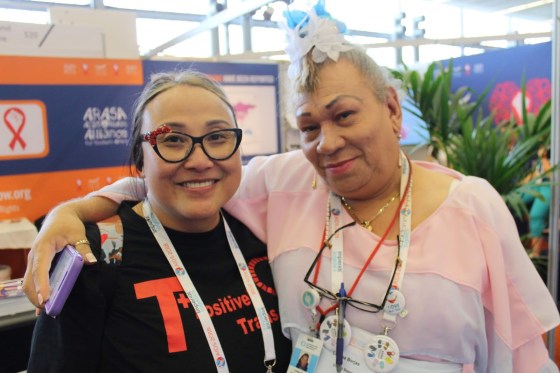
With HIV, I felt more discrimination because I was trans, rather than because I was Asian. After I became homeless, I started to engage in a lot of survival street work, such as sex work, to survive; that led to my arrest [in 1993]. It was very intimidating and scary to be in jail [for a few days] with men. I was coerced into having sex with one of my cellmates; later on that year, I tested HIV positive. However, a women’s clinic denied me medical services, since they didn’t see trans women patients. It was a lot harder to find the right services, and it can get quite discouraging after a while. You still see that happen today—”we’re not funded to see people like you.”
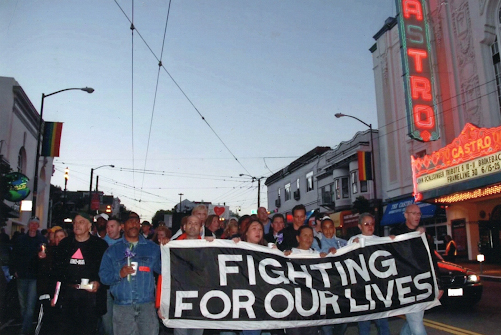
Asians were invisible in the early days of HIV; I don’t remember seeing any images of an Asian living with HIV and dying of HIV. We began to believe that we must not be as impacted as much as other communities. The materials were not translated into too many languages, so it became a challenge to find additional information. It’s also not in our culture to talk about sexual risk. We don’t even talk about it with our family, let alone to strangers about our sexual practice.
I think the severity of COVID escalated because the government failed to respond in a timely fashion, as it did with HIV. It took 30 years for this country to create a national HIV response. I don’t think we learned a lot from that, looking at COVID; it’s cost a lot more deaths than I think were necessary. I’m pessimistic; I think that these things are very cyclical. This is not the first time that there has been an outbreak of an epidemic disease, and I’m pretty sure that this won’t be the last.
Ciarra (“Ci Ci”) Covin
Covin, 33, lives in Philadelphia and is the Program Coordinator for The Well Project. She was diagnosed with HIV/AIDS in 2008. She is currently pregnant with her second child.
I was diagnosed with HIV when I was 20 years old, living in rural Georgia. The life expectancy I found after researching HIV online is how I made some decisions early on. I got married around age 23 and got pregnant with my now 10-year-old son almost immediately, because I was doing math in my head. I said to myself, “If I get pregnant now, I’ll be around 40 when he graduates from high school. I can make it to 40.” Since then, I have made it a mission of mine to educate those around me. I wish that someone like me had reached out to me when I was younger.
The HIV and AIDS community could benefit from the same compassion as those with COVID-19. After I was diagnosed with HIV, I received a lot of discrimination from the people down South. I was kind of under the impression that I was being punished for doing something that I shouldn’t have been doing. A woman told her daughter that I could not come to her house and sit on their furniture, as if they could get HIV from me that way. I think ignorance is everywhere.
I’m as scared as hell of COVID. I became my son’s primary teacher, and I’m a single mom. And not only have we been locked inside, but my city was up in flames [during last summer’s Black Lives Matter protests]—to drive around and see stores getting looted and the racial tension, it just made me so nervous. After Sandra Bland’s death, that’s when I realized that the world really didn’t care about people that look like me. Then in the middle of all it is COVID, more death and more killings, and the trauma that comes.
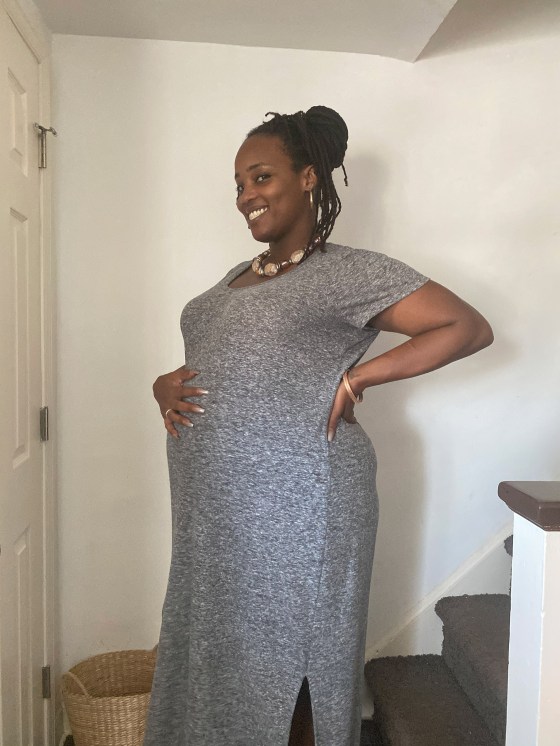
[On May 5], about five days after my grandfather was admitted to the hospital for a stroke, they called us to let us know he had COVID. He died in that hospital on [May 28]. He was alone, probably really uncomfortable. I hate that. How could he have gotten it there? I’m five months pregnant. Now we’re going to be in the hospital with COVID and HIV at the same time. I’m so nervous. How are you gonna protect me from getting COVID—or my baby? So many Black women die and have complications during birth.
Jeff Wacha
Wacha, 61, lives in Los Angeles County. His husband, Garry Bowie, was head of the nonprofit Being Alive, an L.A.-based HIV/AIDS social services organization, until he passed away from COVID-19 complications in April 2020.
In February 2020, when word started getting around аbout COVID, Garry got his staff together, and they put together a mitigation plan. It just kills me that, as diligent as Garry was and prepared as he was, he was one of the first ones to succumb to it. It’s just not right. I didn’t mind taking care of Garry [when he got sick with COVID-19], but I finally had to call the ambulance when his breathing got bad. The EMTs at that time wouldn’t even come in the house. I had to get Garry dressed myself and get him out on the front steps before they would take over.
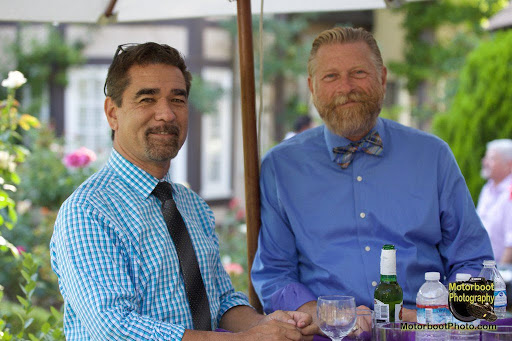
The feeling of being a pariah because you have it reminded me of the feeling when I first found out I had HIV. The fear of being around people who have it, the “am I going to get it?” There’s also the survivor’s guilt. And the panic sets in: “Am I next?” Because that was usually the way it was with HIV.
I did not deal with being diagnosed with HIV as well as Garry did. I went out and ran up all my credit cards as high as I could, thinking that I’d be dead before they came due. He was diagnosed in ’83. He went through the usual depression people go through; back then it was pretty much a death sentence. He quickly pulled himself out of it. When AZT [azidothymidine, an antiretroviral medication used to treat HIV/AIDS approved in the U.S. in 1987] came out, he and his mother would drive down to Mexico and buy all the AZT they could and bring it back, both terrified that they’d end up in jail.
His time at the AIDS Foundation, and at Being Alive, it’s always been about advocacy, it’s been trying to help underserved people. He would spend hours upon hours on the internet doing research. And he would come up with these ideas, saying “Well, what if we tried this?” and he actually would put them into effect. He worked a lot with the homeless population; he was very proud of the fact that it was his idea to get people in and get them the services they need, whether it’s housing, food, medical care, get their viral load back down to zero, and try to give them a normal life.
His primary goal was to stop new infections. Garry firmly believed that through education and practice that, even without new medications, we could eventually eradicate HIV. The entire time he spent in bed with COVID, he was on his computer, checking facts with the CDC and putting it out on social media. The man was sicker than he’s ever been in his entire life. And what’s he doing with his time? He’s finding ways to help other people. His biggest concern was making sure that I was okay. When he did get out of bed, he wouldn’t touch anything unless he got a Clorox wipe out. He’s probably the most compassionate person I’ve ever met.